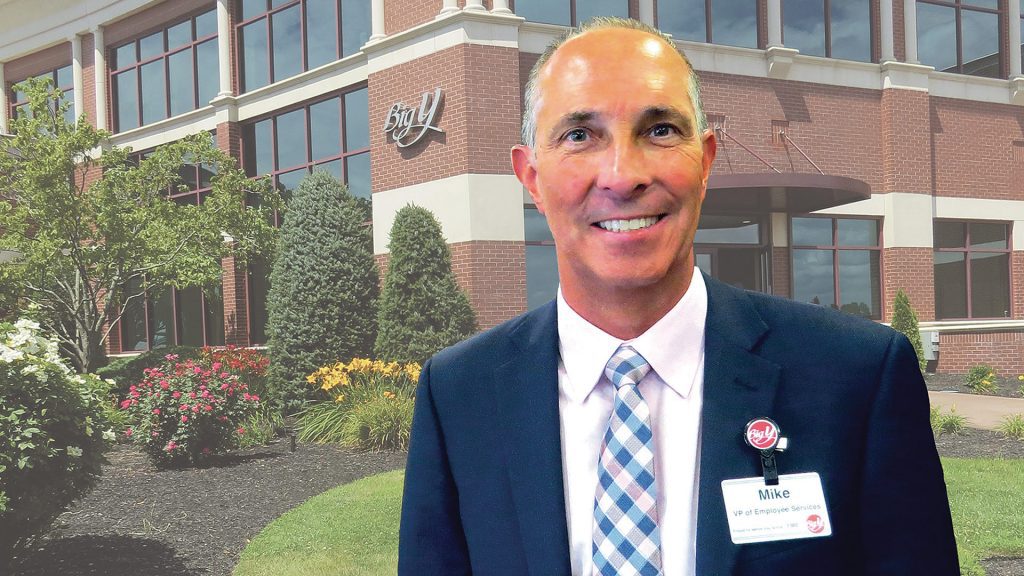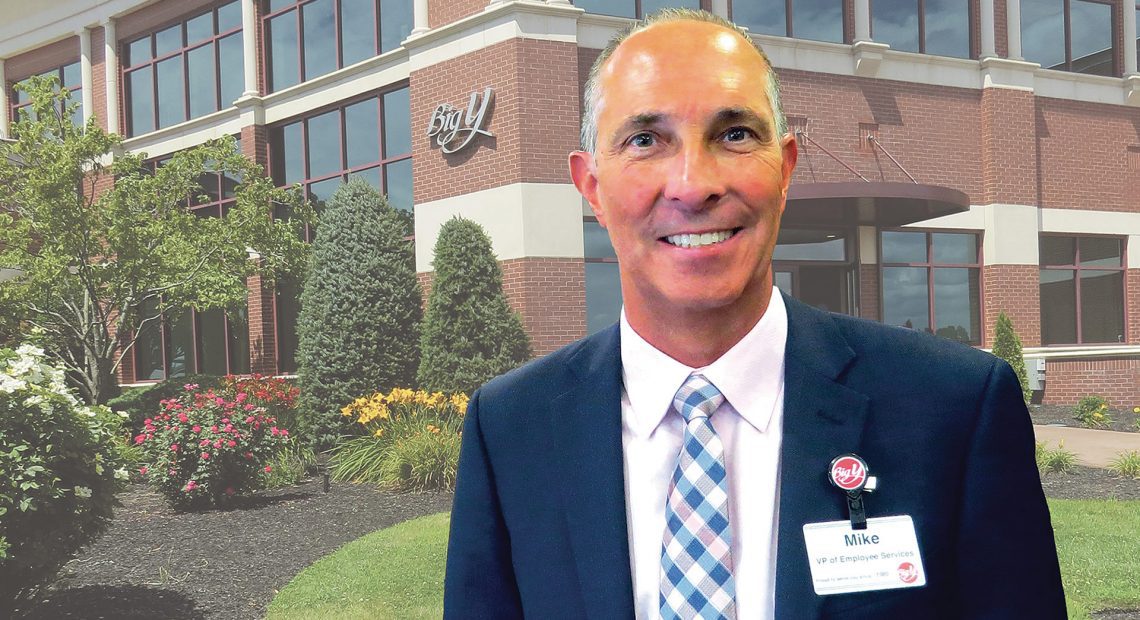Best of Both Worlds

Michael Galat says Big Y is scheduling employees in a way that balances the company’s needs with their own.
Looking over the past year and a half, Lisa Verville isn’t surprised the O’Connell Companies operated smoothly with the vast majority of its team working from home.
“People have stepped up, they did what they needed to do, and work got done,” said Verville, director of Human Resources for the large family of businesses that includes Daniel O’Connell’s Sons, O’Connell Development Group, Appleton Corp., and New England Fertilizer Corp.
“Now, the technical piece of it — if this happened 20 years ago, I can’t imagine it would have worked as well as it did. We didn’t have Zoom back then,” she added. “But we have a very dedicated team. I’m not surprised it worked well.”
Which is why remote work will continue at O’Connell — to a point. Starting last month, employees were required to work on site at least three days a week, and more if they want to.
“We miss everybody,” Verville said. “We have a great culture, and we don’t want to lose that culture. If people are 100% remote, I think there’s a risk of losing that — do people feel connected to their organization if they’re not here, cooperating and collaborating with their team?”
At the same time, “we know we have to balance that with what’s going on with our workers. We want our employees to be happy and feeling as though there’s a balance. That’s our goal.”
Welcome to the new, hybrid workplace, which looks to be a dominant model for employers across myriad industries, at least for the near future.
“People tell us they can do both,” Verville said. “I think it works, and allows for that work-life balance. I think people appreciate the flexibility.”
Big Y has been operating on a hybrid model for its support-center workers since early in the pandemic, said Michael Galat, vice president of Employee Services. And that will continue.
“Obviously, our stores are open nights and weekends, and our goal, as always, is to make sure we’re taking care of our store employees and our customers at all times,” he said. “Business needs may be different for different positions. It’s finding the right balance — making sure we’re taking care of customers but also allowing our people the autonomy to work from home.”
That’s the thinking at MassMutual as well, said Sue Cicco, head of Human Resources and Employee Experience. The company’s return-to-office approach will balance flexibility with in-person collaboration, with most employees transitioning to a hybrid model, working some days in the office and some days remotely.
Ross Giombetti
“I could see a lot of businesses and leaders getting impatient and frustrated; they want the old way to come back and expect everything to be great. But that’s not how it works.”
“We will also continue to support fully remote and fully in-office arrangements where it makes sense,” she added. “Importantly, this approach is designed to incorporate employee flexibility, so it will look different across the company, depending on role, function, and business needs.”
With most employees working 100% remotely during the COVID-19 pandemic, she explained, “we learned that we can successfully operate in a virtual work environment. That said, we also think there’s value in teams meeting in person to spur creativity, social connection, and collaboration.”
The goal now is to build on the work-life flexibility MassMutual has offered for years, while taking into account employees’ feedback from recent engagement and surveys.
“Similar to how we approach many new situations,” Cicco said, “we’ll assess and evolve our approach as we learn more about what works best for our customers, employees, and company.”
Culture of Caring
Ross Giombetti, president of Giombetti Associates — a leadership institute that helps businesses acquire and develop top talent — said the vast majority of his clients are currently maintaining a hybrid model and anticipate sticking with it for at least a while.
“I think most companies realized that, contrary to the initial concerns they may have had, a lot of people were very productive during the pandemic, working remotely, and it actually went a lot better than they thought,” he told BusinessWest. “So a lot of organizations realized that’s here to stay, at least for the foreseeable future.”
At the same time, he added, employers are finding resistance to bringing workers back full-time because remote work has become a habit.
“If you think about how habits are formed and what makes humans comfortable with something, it takes a full 90 days for a new norm or new habit to become part of our routine. Take mask wearing — I would bet most of us took about 90 days to get comfortable and used to wearing a mask.”
Well, many employees stayed home more than five times that long, so the habit has become deeply ingrained, becoming the new norm. Giombetti also noted that many employees told to return to the office, at least part of the time, may be uncomfortable doing so, still fearful of gathering in groups.
Sue Cicco
“By making sure our employees have the flexibility to take care of their families, we set off a virtuous cycle where our people are taken care of, and in turn they can take care of their communities, and that extends to how we can take care of our customers.”
In other words, working at home is a hard habit to break, for many reasons. That’s why most businesses are looking at hybrid scheduling as an acceptable option.
“I could see a lot of businesses and leaders getting impatient and frustrated; they want the old way to come back and expect everything to be great,” he said. “But that’s not how it works. A lot of the advice I’m giving people is to be patient with the process, be patient with people returning to work, whether hybrid or fully. When people are back around large groups of people, there will probably be some nervousness, and we need to be understanding of that.”
At Giombetti’s own company in Wilbraham, Fridays are remote days for everyone, and employees can request to work at home any other day they feel they’ll get more done there, with fewer distractions.
“If our team needs that, I encourage it. That’s how we operate,” he said. “I think many organizations understand it’s better to measure results, attitude, and performance than where they’re doing the work from.”
Galat said Big Y’s leadership learned many lessons over the past 17 months.
“One is that we can still be very productive while employees are working from home — there’s an increase in employee productivity when employees are happy. We’ve always considered ourselves a culture of caring, and this [remote work] has helped people balance their personal needs, whether it’s child care, elder care, whatever.
“I also think a big part of productivity is flexibility,” he went on. “Some may log on earlier in the morning, or at times work later at night.”
While working from home saves on travel time and can boost productivity in other ways, he admitted that it’s important that colleagues come in a few days a week to make sure they’re not missing out on the collaborative components of their jobs. Therefore, managers are expected to work on site at least three days a week, and everyone else at least two.
“Again, it depends on the business needs. That’s a very important component of it,” Galat said. “There may be weeks they have to come in every day, and there may be weeks they can work more from home. Each area supervisor works with them to find that balance based on the business needs and what’s going on in their personal life.”
Workers appreciate that kind of consideration, Cicco added. “By making sure our employees have the flexibility to take care of their families, we set off a virtuous cycle where our people are taken care of, and in turn they can take care of their communities, and that extends to how we can take care of our customers.”
Culture of Collaboration
That said, companies see value in making sure their workforce is physically present, at least part of the time,
“We think there’s value in both in-person collaboration and the flexibility created by working remotely,” Cicco said, adding that most MassMutual employees responding to surveys or other outreach preferred the hybrid option.
“We’ve learned that, while we appreciate the increased flexibility of remote work, we also miss the value we get from face-to-face meetings, impromptu conversations, collaboration across work groups, and what we learn when we’re together,” she went on. “Not to mention the social aspects — having lunch, bumping into friends around the building, and catching up over a cup of coffee.”
In addition, “we believe the connection that comes with being face-to-face brings energy, encourages innovative thinking, accelerates learning, and strengthens relationships and community,” Cicco noted. “With this in mind, we will encourage work groups to come together regularly, for the benefit of their work and their team.”
Giombetti said most of his clients offering hybrid work stress the need to be physically present at times — brainstorming and working through critical issues at a staff meeting, for instance. “Some things are best done in a room with other people. And most clients have found their employees are totally comfortable with that.”
The other challenge for companies has to do with culture, camaraderie, and the kind of collaboration that can’t be easily achieved over Zoom.
“A lot of organizations are training specifically on that topic,” he said. “While you’re honoring the flexibility of your teammates and employees, it’s important to make sure you can maintain that great culture you’ve built.”
Galat agreed, noting that, while Zoom and similar tools have their place and have been an important piece of keeping staff connected, some collaborations are more effective in person.
“We’re big on culture here — that’s a very, very important part of it. When you don’t see people at least part of the time, it’s hard to strengthen those relationships. It’s all about relationship building, and that goes back to who we are as an organization, caring about employees. Yes, we’re allowing them to work from home, but building relationships with people over the years when we don’t see them some of the time, that’s difficult.”
At the same time, Big Y has prepared a series of best practices for employees working remotely, including the need to take regular breaks. “Productivity is important getting the job done,” Galat said, “but we also want to make sure people are taking some time away as well.”
Giombetti said remote work has allowed some bad habits to creep back in, including a tendency to multi-task to the detriment of the main task.
“If you’re in the office, in the conference room, having a meeting, most of us know it would be foolish to pick up the phone when someone is talking to us because that’s just rude,” he explained, noting that it happens much more often during a Slack, Teams, or Zoom meeting. “Unfortunately, the last year and a half maybe caused us to retrench a little bit, and the amount of multi-tasking has increased. We have to guard against that.”
Unexpected Absence
Verville remembers the week in March 2020 when O’Connell’s Holyoke headquarters emptied for what most employees thought would be a temporary detour home.
“People did what they needed to do. There was a real commitment there,” she said. “But I personally didn’t think it would last this long. I think most people left the office and said, ‘see you in a couple weeks.’ No one thought it would be this long. And I missed everyone, so it’s great to get back to some sense of normalcy, if you will.”
That new norm seems to be an understanding among employers that their workers value flexibility, but also that the workplace culture will suffer without some face-to-face collaboration.
“It’s a hard balance,” Giombetti said, “but I think organizations that are intentional about it do it best; that’s the recipe for success.”
It could also be a recipe to attract talent at a time when many companies are struggling with hiring and retention, as many potential workers would be more amenable to a hybrid schedule than five days a week away from home.
“It’s about being able to attract and retain the top talent and finding that balance between supporting the stores — providing the tools to get their jobs done — and being accessible so that people say, ‘hey, I can work at home, and they care about me — I can take care of my family’s needs as well,’” Galat said. “It’s all about the workplace culture, and work-life balance is part of it. We want the best of both worlds.”
Joseph Bednar can be reached at [email protected]








